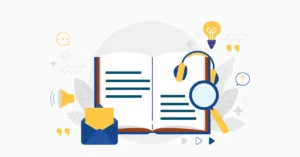
IGCSE English as a Second Language: Listening, Writing, and Speaking
Preparing for your IGCSE English as a Second Language (ESL) exam can feel daunting. You are not just learning grammar
Learn how to write step-by-step answers, and score A* in your exam!

Announcement: Cambridge IGCSE, O Level and AS & A Level June 2025 past papers are now available.
A summary is a shortened version of a passage containing the key points in as few words as necessary. The summary exercise requires the ability to identify the main ideas, express them in one’s own words, and arrange them in a logical sequence, all while adhering to a word limit.
Content. Answer directly the question and focus on the relevant points only. Use as much material as possible; while exercising caution towards any irrelevant details. Take points directly from the passage and avoid repeating similar points, even if they were mentioned twice.
Your summary must be supported by references and directly connected to the passage. Adding facts or opinions is not suggested since this exercise is meant to summarise, not add to the original ideas. You will only obtain content marks when you provide the right content.
Language. Write your summary in your own words as far as possible. Although the message must be the same, the wording must be different. The replaced words must convey the essence of the point. Only change the words when appropriate. Therefore, there is no need to find synonyms for technical objects, e.g., solar heaters.
Lifting a few words is acceptable if it shows evidence of understanding and focuses on key details. But avoid over-lengthy lifting and quoting straight from the passage. Find precise words to use and vary your choices.
Writing Style. Express the key points clearly, succinctly, and fluently using an impersonal and formal writing tone. Connect your ideas into a paragraph to organise and sequence points cohesively. Try to use complex sentences instead of simple or compound structures, and ensure that you use correct spelling, punctuation, and grammar.
Avoid any introductions and conclusions, and instead, begin your summary with the exact wording of the question. Then, do not include examples, repetition, direct speech, figurative language, and minor details in your summary. Lastly, ensure that your ending is strong and impactful.
Word Limit. Always write your summary within the word count, as this exercise assesses the ability to write concisely. There are no penalty marks for writing more or less. However, it may be self-penalising to write more than suggested. Going over the word limit implies poor structure or unclear ideas. On the other hand, writing way too less than the limit may mean the response does not have sufficient coverage. For example, if the question requires 200 to 250 words, but you only provide 180 words, there is a chance that you do not include sufficient points.
Before the exam, check how many words you write on a line; then, you’ll know approximately how many lines you will need. Lastly, do not write beyond the lines given to avoid your answers not fitting into the scanned screen.
Join 62,169 (and counting) IGCSE & AS/A Level subscribers who've taken our insanely valuable FREE email courses. Learn exam tips & score A* in your exam!
| Prefix | Meaning | Examples |
|---|---|---|
| anti- | against/opposed to | anti-government, anti-racist, anti-wat |
| auto- | self | autobiography, automobile |
| de- | reverse or change | de-classify, decontaminate, demotivate |
| dis- | reverse or remove | disagree, displeasure, disqualify |
| down | reduce or lovwe | downgrade, downhearted |
| extra- | beyond | extraordinary, extraterrestial |
| hyper | extreme | hyperactive, hypertension |
| il-, im-, in-, ir- | not | illegal, impossible, insecure, irregular |
My daughter got an A*
“My daughter got an A* for her English First Language! Skolatis gave her the confidence she needed.”
~ Carrie (Malaysia)
In 2024, Cambridge IGCSE removed the summary task from its English as a Second Language Reading and Writing paper.
Find out in our A* Model Answers. Copy the style and score A*!
Come join our A* revision courses that are designed based on proven A* scoring system, move up your level and reach your A*!
* Note: Some relevant info taken from CIE.
Join 62,169 (and counting) IGCSE & AS/A Level subscribers who’ve taken our insanely valuable FREE email courses. Learn exam tips & score A* in your exam!
Abhishek Bathina
Abhishek Bathina
Raunaq Nambiar
Raunaq Nambiar
Jyoti
Jyoti
Soham Santra
Soham Santra
Nawal Amir
Saudi Arabia
Nawal Amir
Saudi Arabia
Holly Rossen
Holly Rossen
Aditi Sudarsan
Aditi Sudarsan
Pranav
Malawi
Pranav
Malawi
John
Vietnam
John
Vietnam
Reinard Swart
South Africa
Reinard Swart
South Africa

Preparing for your IGCSE English as a Second Language (ESL) exam can feel daunting. You are not just learning grammar

Choosing the right educational pathway for your child is one of the most significant decisions a family can make. In

The IGCSE English First Language exam places a strong emphasis on creative writing, with writing descriptive and narrative essays being

In the IGCSE English First Language Directed Writing task, you’ll be required to either write a speech, letter, or article
89 responses
Will it be fine if I exceed the word limit in my igcse examinations or will my marks be cut?
Hi Ayaan,
If you are writing a summary ? DO NOT exceed the word limit. If there are needed points inside the excess words, it won?t be marked and would be crossed out.
TIP:
It is best to write a cohesive piece of writing, with ideas presented in a logical sequence. Use linking words and phrases to connect ideas. Aim for quality rather than quantity. This means to focus more on writing excellent English rather than a long essay.
When will the 2018 Oct/Nov papers be published
Hi Saaim,
We do not have a fixed date to upload the papers. We upload the past exam papers as soon as we get ahold of them ? can be anytime after the results are released. You may need to check our website from time to time.
What is the range of the ideas included in any summary ?
Hi Ibrahim,
All the points must be taken from the passage. Only include ideas that directly answer the question, any redundant material or extra information from the text should not be included. Furthermore, keep your summary objective ? do not include personal experiences, comments or opinions. Lastly, content marks will only be obtained when the right content is provided.
You may also be interested in our exam model answers. Our model answers will show you what is an A* answer like: https://www.skolatis.com/igcse-exam-resources/
IT is kind of impossible for me to write in the word limit please help me and kindly leave some tips as well
Hi Zeyad,
It is best to write a cohesive piece of writing, with ideas presented in a logical sequence. Use linking words and phrases to connect ideas. Aim for quality rather than quantity. This means to focus more on writing excellent English rather than a long essay.
I am struggling with summary writing.I always exceed the word limit, no matter how much I try, I still can’t come up to the limit.Any tips?
Hi Sarah,
Aim for quality rather than quantity. This means to focus more on writing excellent English rather than a long essay.
Kindly read the article above for more tips.